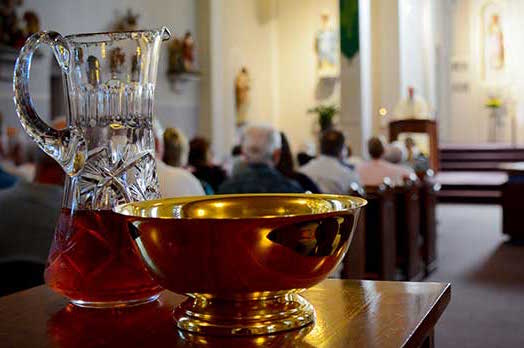The Real Presence
Note: This is the fourth in a five-part series on the Real Presence of Jesus Christ in the Eucharist.
It’s not uncommon for a priest to hear, in the confessional, a penitent express frustration that, despite frequent reception of Holy Communion, they are struggling with overcoming habitual sin.
“Oftentimes, they will despair of their inability to conquer these vices and they will speak about how even though they engage in a variety of spiritual practices and receive Holy Communion — maybe even daily — they do not seem to receive the effects of that spiritual growth. It doesn’t seem to transform their moral life; it doesn’t seem to help them grow in virtue,” said Fr. Stephen Buting, associate pastor of Lumen Christi Parish in Mequon.
But the fact of the matter is that the Eucharist is never unable to deliver graces. It is simply that we are sometimes not able to fully receive them.
Fr. Buting explained that receiving Communion strengthens the infused moral virtues — prudence, temperance, fortitude and justice — as well as the theological virtues of faith, hope and charity.
However, it does not “substitute or replace our own natural growth in those virtues.”
“It’s filling up our spiritual capacity to perform these virtues, but if there’s no natural habit underneath that virtue, then a lot of times it acts more like rainfall on a bone-dry field or desert,” he said. “It runs off instead of sinking into the ground, because the ground doesn’t have the receptivity, in that moment, to receive that and be transformed by it. It just kind of sloughs off before it really has an impact.”
Which is why the Eucharist is not a magical pill for the easy cure of all sins. It is, rather, an instrument by which a multitude of grace is made accessible to those who will avail themselves of it.
It’s not so unlike the sacrament of marriage. A Catholic couple who has vowed to love and honor one another all the days of their lives will not find it easy simply because they made that promise in front of a priest. But having entered into that sacrament in the Catholic Church, they can draw upon the graces poured out by the Holy Spirit to nourish and sustain their relationship even if it is subjected to unimaginable strain.
So it goes with the Eucharist. “How do we avoid situations of sin, how do we manage our emotions in the midst of occasions of sin? We expect on a spiritual level that we’ll be able to rise above our natural state, but grace builds on nature, and so we can ask God to strengthen our natural habits in addition to infusing those virtues within us on a supernatural level,” said Fr. Buting. “Both are absolutely necessary and both are key components for overcoming those tendencies to habitual sins that we can often fall into.”
“If we are struggling to stay out of sin, and are resolved to fight temptation as best we can, then the Eucharist becomes a great help,” said Fr. Michael-Joseph Paris, OCD, a Carmelite priest serving at the Basilica and National Shrine of Mary Help of Christians at Holy Hill. “As Pope Francis has reiterated, it is a remedy for our weakness, not a reward for our virtue. It strengthens us and gives us courage to let go of what only seems to satisfy, and to find the exhilarating freedom of living authentically as a child of God.”

